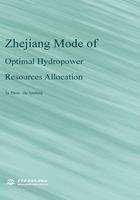
1.4 Research Content and Innovation
1.4.1 Main Content
This study pulls together hydrological and water resources research,combs through theories of resources pricing,property right,and institutionalization,and explores the following aspects in combination with the real situations in Zhejiang Province.
1.Paid use of hydropower resources based on optimal allocation
Targeting at the optimal allocaton of hydropower resources,this study explores approaches to its paid use with the established modern market-directed allocation model integrated with incentive and compatible system arrangement.Special focus is given on the interal mechanism of pricing the right of using hydropower resources with the market playing a decisive role in resources allocation.
2.Characteristics of hydropower resources as property right and the resources compensation mechanism
In this part,importance is attached to the characteristics of hydropower resources as property right and corresponding internal compensation mechanism.The mixed property right of hydropower resources is discovered,Hydropower resources property system is built up;ownership of hydropower resources is sorted out.Resources compensation mechanism is proposed in accordance with the mixed property right of hydropower resources.
3.Externality of hy dropower resources ex ploitation and corresponding economic compensation mechanism
The inner mechanism of economic compensation is studied in this part.The externality of exploiting hydropower resources is analyzed,and the way of internalizing it is explored,that is to build up the economic compensation mechanism for the externality of hydropower resources development by establishing an economic compensation model with special focus on the three coordinate relations among the stakeholders.
4.Intergeneration cost of ex ploiting hy dropower resources and the ecological compensation mechanism
The inner mechanism of ecological compensation is studied.By analyzing the impacts of hydropower resources exploitation on the ecological system of river basins,an ecological system evaluation approach is adopted to discuss ecological compensation from both ecological discharge and flood pulse.An ecological compensation mechanism is established at engineering,scheduling and institutional levels.
5.Some factors contributing to the optimal allocation of hydropower resources
Many attentions have been attached to the development and exploitation of renewable energies now,and ecological environment could be protected via the operation of renewable energy and carbon emission exchange market.In this part,efforts are made to integrate the paid use of hydropower resources and three compensations,put forward the efficiency target of hydropower resources allocation under sustainable development goals,and structure a technical framework for hydropower resources development compensation at micro,meso,macro,and super macro levels.
1.4.2 Main Innovation
Great achievements have been made in the past fifteen years both through theoretic research and comprehensive summary of the practices inside and outside Zhejiang Province.Innovation of the study includes:
(1)Paid use system for hydropower resources exploitation is innovatively proposed.An auction market is established for the compensated transfer of hydropower resources.A regression analysis model is set up for the price of transferring resources.These are supposed to guide the practices of water resources bureaus at provincial,municipal and county levels.
(2)A mixed property right system[3]is for the first time established for hydropower resources management.It can enable the developer to use the right of exploiting hydropower resources and operate hydro plants for profits,and realize the public services under certain conditions,such as flood control and drought relief.The mixed property system also offers a sound solution to the dispute over private or state investment on constructing hydro plants in the past decade.[4]
(3)The minimum ecological runoff is first proposed in the ecological compensation for hydropower resources,which is defined as the flow of the affected river reach after the dam no less than the average monthly flow of the driest month with recurrence of ten years.It overcomes the defect in current ecological compensation in domestic research due to over fuzziness and the lack of quantitative method.Therefore,a set of high-end and practical policy instruments are created.
(4)The study has pioneered and successfully practiced the compensation mechanism in developing and exploiting hydropower resources,including resources compensation,economic compensation,and ecological compensation.Together with the paid use system for hydropower resources,it constitutes a complete hydropower resources allocation mode under market economy.
(5)The sustainable development goals and contributing factors for hydropower resources allocation are proposed.The former includes efficiency goals at three levels,respectively,the internal operational efficiency of hydro plants,networked scheduling efficiency of hydro plants within a river basin,and the efficiency of hydropower facilitating regional economic development.The hydropower resources allocation under sustainable development goals should not only meet the above three efficiency targets but also reach an overall balance.